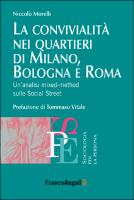La convivialità urbana nei quartieri di Milano, Bologna e Roma
Un’analisi mixed-method sulle Social Street
Abstract
Two processes have affected cities in the last twenty years: an increase of the 'mobile' population and the digital explosion, with particular attention to digital social networks. The debate, both academic and public has immediately highlighted the risky potentialities inherent in these changes, as they could be responsible for greater individualism and lack of interest in caring for their own neighbourhood. Yet, forms of urban aggregation continue to appear, even in rather innovative and spontaneous ways. It is the case of Social Streets, groups of previously unconnected neighbours, who get to know each other through Facebook and become active by promoting conviviality in the neighbourhood. This book reconstructs trough sociological lenses, the spread of the Social Street phenomenon in the three cities with the largest number of these experiences. It investigates why the spread is not homogeneous within cities. It analyses opinions and feelings of activists, understanding if and how this phenomenon produces effects on those who participate and on neighbourhoods that host them. It explores forms of mobilisation that Social Street promote for the care and sociability of their streets and neighbourhoods and how this phenomenon detaches from more traditional associative realities. Particular attention is given to the comparative approach, to understand differences between those who participate in Social Streets and those who do not, showing how urban conviviality is possible, but facilitated by some factors and hindered by others.
Keywords
Social Street, urban conviviality, mixed-methods, urban sociology, comparative approachISBN
9788835142218, 9788835142218Publisher
FrancoAngeliPublisher website
https://www.francoangeli.it/Home.aspxPublication date and place
Milan, 2022Series
Sociologia per la persona,Classification
Sociology
Social and ethical issues


 Download
Download